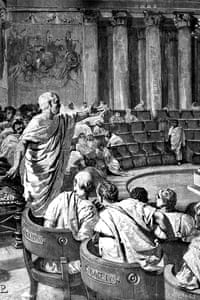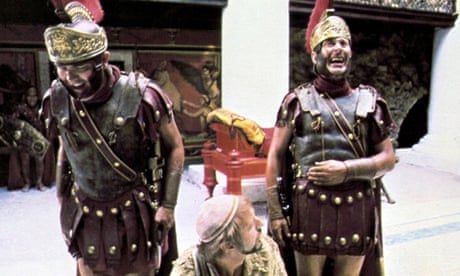One of Enoch Powell's most famous quips was prompted by an encounter with the resident House of Commons barber: a notoriously chatty character, who enjoyed treating captive clients to his views on politics and the state of the world. When Powell went in for a trim, the barber asked the standard question: "How should I cut your hair, Sir?" "In silence," was Powell's instant riposte.
Even Powell's political enemies have usually admitted, a bit grudgingly, that this was a rather good joke. But what they haven't realised is that it has a history going back more than 2,000 years. Almost exactly the same gag features in a surviving Roman joke book: the Philogelos (or Laughter Lover), a collection of wisecracks probably compiled in the fourth or fifth century AD. As with most such collections, some of the jokes included were already decidedly old by the time they were anthologised. In fact, we can trace the "chatty barber" gag back to Archelaus, a fifth-century BC king of Macedon. The "how should I cut your hair?" question was standard even then. And Archelaus is supposed to have replied to his own garrulous barber, "In silence."
Presumably part of the fun for Powell (who was a better classicist than politician) was that he knew exactly how ancient the joke was. Whereas others admired what they believed to be his spontaneous quip, he must have been taking pleasure in the secret knowledge that he was merely repeating the age-old gag of an ancient Macedonian king, and one that may already have been prompting more groans than giggles when it was featured in the Roman Philogelos.
That joke book is one of the most intriguing survivals from the classical world. Containing some 260 short gags, written in Greek (we shouldn't forget that the Roman empire was effectively a bilingual culture, using both Latin and Greek), it has come down to us in various, slightly different versions, painstakingly copied out by medieval monks – who no doubt got more fun out of this than out of some of the classical texts they were made to transcribe. We have no real idea of who originally compiled it, still less why they did so. One ancient encyclopedia seems to suggest that it was the kind of book that you would take to the barber's shop (a well-known haunt in the Roman world of jokesters and gossips, never mind garrulous hair-cutters). Modern explanations have ranged from seeing it as an aide-memoire for a Roman standup comic to imagining it as a rudimentary database for some ancient theorist of jokes and laughter. (Sadly, there is no very reliable English translation in print, but Dan Crompton's A Funny Thing Happened on the Way to the Forum gives a fair idea of the flavour, as does an online version by William Berg.)
Back in antiquity there were plenty of other books of this type. In fact, collections of "wit and wisdom" of famous rulers and politicians seem to have been a thriving literary genre in the Roman period. We have a few quotations from a compendium of jokes of the first emperor Augustus (not all brilliant: "When a man was nervously giving him a petition and kept putting his hand out, then drawing it back, the emperor quipped, 'Hey, do you think you're giving a penny to an elephant?'"). And we get a rather sharper sense of fun from some of the surviving jokes of Marcus Tullius Cicero. Rome's celebrity orator now has the reputation of being a rather pompous and deeply conservative preacher. But 2,000 years ago Cicero was well known for his wit ("far too funny for his own good", or "a laughter addict" was the Roman judgment). His bons mots were collected in three hefty volumes, of which we just have a few excerpts. One favourite was his swipe at the apparently diminutive husband of his daughter: "Seeing his son-in-law, Lentulus, a short chap, kitted out with a long sword, he said, 'Who tied my son-in-law to his sword?'" (There are worse.)

The Laughter Lover is the only collection to come down to us more or less complete. It's arranged broadly according to the subject matter of the jokes. Most of those in the first half of the book, a hundred or so, have as their theme (and victim) a character called in Greek a "scholastikos" – sometimes translated as an "egghead" or "absent-minded professor". Whatever you choose to call him, the scholastikos is so clever that he's stupid, and regularly uses his (ostensibly) highly trained brain to come to precisely the wrong conclusion. "A scholastikos went for a dip and nearly drowned. So he swore that he'd never go near water again until he'd learned to swim," is a fairly typical example. "False analogy syndrome", as a philosopher might call it, is the scholastikos's most besetting sin – as in this classic case of advice given by an "egghead doctor": "'Doctor,' says the patient, 'whenever I get up from my sleep, for half an hour I feel dizzy, and then I'm all right.' And the doctor says, 'Get up half an hour later, then.'"
The second part of the book features a range of other comic-type characters: from crooked fortune tellers and cowardly boxers to sharp-talkers, men with bad breath and – a predictable target in this decidedly misogynistic culture – "oversexed women": "A young man said to his oversexed wife, 'Wife, what shall we do? Eat or have sex?' 'Whatever you want,' she replied, 'but there's no bread.'" By far the largest category after the scholastikos, though, are jokes at the expense of particular nationalities, and they bear more than a passing resemblance to "Irish" jokes, or "Belgian" jokes as told in France. Some of the main victims are the people from the city of Abdera, in what is now northern Greece. Why they, above others, should have been targeted for the ancient equivalent of the "how many Irishmen does it take to change a lightbulb" treatment, we haven't a clue. But joke after joke homes in on their stupidity: "A man from Abdera, seeing a eunuch chatting with a woman, asked someone else if it was the eunuch's wife. When the man observed that a eunuch couldn't have a wife, he said, 'Ah, so it's his daughter then.'" And so on, in a fairly predictable vein – though with occasional surprises. One "joke" features a man from Abdera catching sight of a runner who has just been crucified. "By the gods, now he really is flying," he says. Crucifixion isn't exactly part of the repertoire of modern jokes, even at the most tasteless end of the spectrum.
That crucifixion gag raises the question of how far Roman jokes – or indeed the whole culture of Roman laughter (when you do it, how and at what) – are like our own. Some of the jokes in the Philogelos do seem to match modern expectations – not only Powell's "chatty barber" quip (which in the Roman joke book is put in the mouth of a "sharp talker"). Another has sometimes been claimed, perhaps over optimistically, to be the ancestor of Monty Python's "dead parrot" sketch. It features the scholastikos again: "'That slave you sold me died,' a man complained to a scholastikos. 'Goodness me,' he replied, 'he never did that when I owned him.'" But there are also quite a number that would never get a modern audience cracking up. Try "A scholastikos had bought a house and went around carrying one stone from it to show people what it was like." However you say it, it falls flat.
The truth is that some of these jokes might not have seemed very funny to the Romans either, no matter how the most sparkling ancient comic might have delivered them. There isn't a joke book in the world that doesn't include some real duds; and I doubt if the Philogelos was any exception. But we still face much bigger issues. Leaving aside the bad jokes, how far should we imagine that jokes and laughter are a universal, "natural" human phenomenon transcending boundaries of time and space? Or how far are they culturally specific, with people in different places and in different historical periods laughing at very different prompts in very different ways? Why on earth should we expect to "get" 2,000-year-old jokes at all?
It is clear enough that there are major cultural differences involved in laughter and humour. Any English speaker who has tried to tell (or fully understand) a joke in France will know the problem – just as some ancient Romans were well aware that the conquered Germans had different rules of laughter from their own ("The Germans don't laugh at vice", as one curmudgeonly Roman critic observed). And, more domestically, any parent will know what an effort it is to socialise a child into laughing at the "proper" targets: the fat lady on the bus, no; The Simpsons, yes.

And it's not just a matter of what we choose to laugh at; there's the question of how, physically, people laugh, too. The most famous anthropological example of this comes from the pygmies of the Ituri Forest in what is now the Democratic Republic of the Congo. Not only do the pygmies "laugh easily" compared with other more dour and solemn tribes, but they laugh in a very distinctive way. They are supposed to lie down kicking their legs in the air, panting and shaking in paroxysms of hilarity. For those of us trained in less flamboyant expressions of mirth, this might seem an over-exuberant or contrived display, but the pygmies have so internalised the conventions of their own culture that it is, for them, quite "natural". (Or so, at least, it seemed to the popular anthropologist Colin Turnbull, who is – so far as I am aware – the only western writer known to have actually witnessed this display, and who had his own romantic axe to grind about the fun-loving forest people. But the colourful image of the pygmy kicking his legs in the air has proved such a compelling example of the different conventions of laughter that even the most hard-headed theorists have been reluctant to abandon it.)
The issues get even more marked – and more complicated – when we try to insert a chronological dimension too. It might seem to go without saying that there were different codes of practice in the laughter of the past. But how do we reach them and what do they mean? Vic Gatrell's brilliant City of Laughter points to the bawdiness of 18th-century humour in London even – or especially – among the elite (plenty of "low manners in high places" as he nicely puts it). But how does that fit with the oft-cited views of Lord Chesterfield in the 1740s, that audible laughter was extremely vulgar and that a gentleman should at all costs avoid laughing out loud? On the surface Chesterfield seems to lie at the opposite end of the laughter spectrum from the laughing pygmy (and Nietzsche was of the view that most Englishmen were, more or less, buttoned up in a sub-Chesterfield kind of way). But there is more than meets the eye here too: for all his strictures on audibly cracking up, his lordship was also a celebrated wit and prankster. Did he not expect people to laugh out loud at his pranks?
The other side of laughter is its apparent biological universality. The human being is, almost by definition, the only animal in the world to laugh. That, at least, is what many people have insisted from antiquity on – while prompting at the same time all kinds of counter-claims that other species share our expression of mirth (monkeys and, most recently, rats being the most common candidates, though there is one suggestion, in an ancient Jewish commentary, that for some reason Aristotle thought herons were laughers too). The biological baseline here is usually the laughter caused by tickling, which most of us assume to be some simple form of reflex action. We are not entirely right on that (you cannot, significantly, produce laughter by tickling yourself, and at least one classical writer thought that the lips were the prime site for tickling rather than – as we would more likely have it – the soles of the feet or the armpits, which itself suggests a cultural aspect to the phenomenon). But even so laughter on being tickled is so widespread across the human race that it is as near to a "natural" reaction as we can get.
Some critics would go a lot further to suggest that the fundamental ways in which jokes and other forms of display elicit laughter follow universal laws across the human species – no matter what the different culturally specific prompts might be (whether a crucified runner for the Romans, or Bart Simpson for us). Freud, for example, famously saw laughter as a form of "relief". In the simplest terms, when we laugh at a joke about (say) an undertaker, what causes our diaphragm to pulsate and chest to heave, he said, is the release of the psychic energy that would otherwise have been used to repress our anxiety about death that the joke expresses. (He had more trouble explaining on these principles why we laugh at clowns, but he managed – albeit rather tortuously.)
Another theory, which goes back in some form to ancient Greek philosophy, argues that all laughter is an expression of superiority: it is, in other words, always an aggressive response, a form of derision or mockery (laughing at, rather than with). Modern evolutionary biologists have also chimed in here, tracing laughter's origins among the earliest humans back to the roars of triumph in the combat between primitive primates (or alternatively to an aggressive baring of the teeth as they faced up to each other). Why, on this theory, we should laugh at puns is not clear. But perhaps they too had something to do with ritualised contests for supremacy in the world of early man. Or perhaps not.
The third main theory is often called the "incongruity theory". For this sees laughter as a response to the illogical or the unexpected. Aristotle offers a very simple example of this: "On he came, his feet shod with his – chilblains." This raises a laugh, Aristotle explains, because the listener expects the word "sandals" not "chilblains". And far more complicated versions of it have been developed right up to the present day, including some very influential theories that put incongruity, or the unexpected, at the very heart of verbal joking ("When is a door not a door?" "When it's a jar" being only the most obvious example). One big problem here, though, is why the mental recognition of some form of incongruity should produce the physical movements and distinctive sounds that we call "laughter".
It would be unwise simply to dismiss these attempts at universalising theory out of hand. Laughter feels much the same in every context in which it occurs, from being tickled to watching a sitcom, so it is not necessarily unreasonable to seek out some single underlying cause that might transcend time and space. Besides, recent work in neuroscience has come closer to unearthing the areas of the brain and the neuro-pathways that govern the production of laughter in humans, and possibly other species. All the same, the more you look at laughter's history, the more it seems that – whatever the biological substrate – culture has a bigger part than nature to play in the whole process. But, as the Philogelos and its modern reception hints, it's probably more complicated than any such simple opposition between nature and culture might imply.
A few years ago the standup comedian Jim Bowen scored a great success with a performance of a selection of jokes from the Laughter Lover; the audience, it is said, were in stitches. How do we explain the fact that Roman jokes can still get an audience cracking up, so many centuries later, in such a radically different world?
Reading on a mobile? Click here
In part, it is probably because we do still share with antiquity some of the same prompts to laughter – whether that is because of some universal structure of joking, or rather because, as Powell's borrowing reminds us, ancient jokes are sometimes the direct ancestors of our own modern comic quips. In fact, well before Powell, wits and scholars from the Renaissance onwards turned directly to ancient texts for their inspiration when they started to lay the groundwork for modern European "laughter–culture", and to put together all those hugely popular collections of jokes and "merry tales"; it was, after all, less work than making up the jokes themselves. One 18th-century classicist is even said to have planned to write a scholarly edition of the best-known joke book of that period, Joe Miller's Jests, in order to show that every single joke in it was descended from the ancient Laughter Lover. He would have been wrong – but not as wrong as you might think.
But there was more to Bowen's success than that. It partly rested on careful selection (I rather doubt that the one about the crucified runner made the cut); partly on clever translation into modern joking idiom, which acts as an implied instruction to laugh ("There was a scholastikos, a barber and a bald man ..."); and partly on the important comic skills of delivery and timing. But, perhaps even more, it rested on the audience's desire or even determination to laugh. They had come in order to laugh. Why else go to see a standup? Bowen himself played on the absurdity of the whole occasion, to the extent that many of the most determined laughers were no doubt also laughing at themselves for laughing at these very, very old Roman jokes, which in other circumstances might not have been funny at all. It's the hilarity of bluff and double bluff, and the pleasure of self-irony.
In fact, I half suspect that Bowen's version of the Philogelos – and maybe, before that, Powell's version of the "chatty barber" – might have prompted more enthusiastic guffaws today than it ever did in the classical world itself.








Comments (…)
Sign in or create your Guardian account to join the discussion